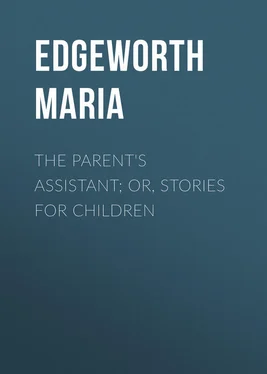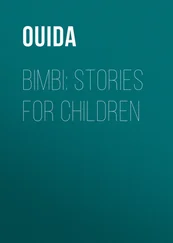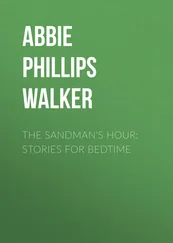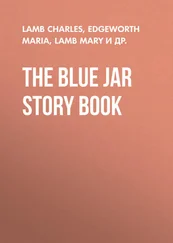Maria Edgeworth - The Parent's Assistant; Or, Stories for Children
Здесь есть возможность читать онлайн «Maria Edgeworth - The Parent's Assistant; Or, Stories for Children» — ознакомительный отрывок электронной книги совершенно бесплатно, а после прочтения отрывка купить полную версию. В некоторых случаях можно слушать аудио, скачать через торрент в формате fb2 и присутствует краткое содержание. Издательство: Иностранный паблик, Жанр: foreign_antique, foreign_prose, foreign_children, на английском языке. Описание произведения, (предисловие) а так же отзывы посетителей доступны на портале библиотеки ЛибКат.
- Название:The Parent's Assistant; Or, Stories for Children
- Автор:
- Издательство:Иностранный паблик
- Жанр:
- Год:неизвестен
- ISBN:нет данных
- Рейтинг книги:5 / 5. Голосов: 1
-
Избранное:Добавить в избранное
- Отзывы:
-
Ваша оценка:
- 100
- 1
- 2
- 3
- 4
- 5
The Parent's Assistant; Or, Stories for Children: краткое содержание, описание и аннотация
Предлагаем к чтению аннотацию, описание, краткое содержание или предисловие (зависит от того, что написал сам автор книги «The Parent's Assistant; Or, Stories for Children»). Если вы не нашли необходимую информацию о книге — напишите в комментариях, мы постараемся отыскать её.
The Parent's Assistant; Or, Stories for Children — читать онлайн ознакомительный отрывок
Ниже представлен текст книги, разбитый по страницам. Система сохранения места последней прочитанной страницы, позволяет с удобством читать онлайн бесплатно книгу «The Parent's Assistant; Or, Stories for Children», без необходимости каждый раз заново искать на чём Вы остановились. Поставьте закладку, и сможете в любой момент перейти на страницу, на которой закончили чтение.
Интервал:
Закладка:
Maria Edgeworth
The Parent's Assistant; Or, Stories for Children
INTRODUCTION
Once when the present writer was a very little girl she suffered for a short time from some inflammation of the eyes, which prevented her from reading, or amusing herself in any way. Her father, who had just then returned from the East, in order to help her to pass the weary hours began telling her the story of the 'Forty Thieves,' and when he had finished, and had boiled down the wicked thieves in oil, and when she asked him to tell it all over again, he said that he would try and find something else to amuse her, and looking about the room he took up a volume of the Parent's Assistant which was lying on the table, and began to read aloud the story of the 'Little Merchants.' The story lasted two mornings, and an odd, confused impression still remains in the listener's mind to this day of Naples, Vesuvius, pink and white sugar plums – of a darkened room, of a lonely country house in Belgium, of a sloping garden full of flowers outside the shutters, of the back of a big sofa covered with yellow velvet, and of her father's voice reading on and on. When she visited Naples in after days she found herself looking about unconsciously for her early playfellows.
Not only Francisco and Piedro, but all those various members of the Edgeworth family who play their parts in fancy names and dresses in Miss Edgeworth's stories, became her daily familiar companions from that day forth.
Many of the stories in the Parent's Assistant were written in a time when wars and rumours of wars were in the air; these quiet scenes of village life were devised to the sound of clarions. Rebels were marching and countermarching; volunteers were assembling; husbandmen, throwing away their spades, were arming and turning into soldiers; the French were landing in Ireland. 'I cannot be a Captain of Dragoons,' writes Miss Edgeworth, 'and it would not make any of us one degree safer if I were sitting with my hands before me.' So she quietly goes on with her stories. One or two of them were written at Clifton, and very early in her career an illustrated edition had been suggested by the publishers. A young Irish neighbour, with a taste for the fine arts, was asked to make the drawings to these stories, and it was this lady, Miss Beaufort, the daughter of the Rector of Colon, who afterwards became the fourth Mrs. Edgeworth. Not long after his third wife's death in 1797, Mr. Edgeworth wrote a letter to Dr. Darwin at Lichfield, in which he gives him various items of family news. He writes of portraits (Dr. Darwin, Mr. Thomas Day, and Mr. Edgeworth, had all sat for their portraits); he writes of Upas trees, of frozen frogs, of farming and rack-rents; of pipes for hot-houses to be heated by stable dung, of speaking machines, and finally in a postscript he announces the fact of his being engaged to be married for the fourth time, 'to a young lady of small fortune and large accomplishments, much youth, some beauty, more sense, uncommon talents, more uncommon temper, liked by my family, loved by me.'
These were stormy times for Ireland: a few days after the letter was written, a conspiracy was discovered in Dublin, and the city was under arms. Mr. Edgeworth set out immediately to join the Beauforts, who were there. The true-hearted daughter now admires her father for urging on the marriage. 'Instead of delaying, as some would have advised, my father urged for an immediate day. He brought his bride home through a part of the country in actual insurrection.'
There is a grim story of the new-married pair on their way to Edgeworthstown passing the suspended corpse of a man hanging between the shafts of a cart. Miss Edgeworth in her Memoirs of her father gives a striking account of the family assembled to receive the new wife. It is a grandson of this last Mrs. Edgeworth who is the present owner of Edgeworthstown.
The Parent's Assistant had just been written; but one or two of the stories in the present collection were not added till much later, such as 'The Bracelets,' which were written in Switzerland to make up a proper allowance of copy for a new edition. It is hard to make a choice among these charming and familiar histories. They open like fairy tales, recounting in simple diction the histories of widows living in flowery cottages, with assiduous devoted little sons, who work in the garden and earn money to make up the rent. There are also village children busily employed, and good little orphans whose parents generally die in the opening pages. Fairies were not much in Miss Edgeworth's line, but philanthropic manufacturers, liberal noblemen, and benevolent ladies in travelling carriages, do as well and appear in the nick of time to distribute rewards or to point a moral. Rosamond of the Purple Jar reappears in the Birthday Present , which gives one an odd picture of the customs of those days. We read of the little lace girl who leaves her pillow upon a stone before the door, and of the footman laced with silver, who having entangled the bobbins and kicked the pillow into the lane, jumps up behind his mistress's coach and is out of sight in a minute. Wise Laura, who had not, like Rosamond, spent her half-guinea upon filigree paper, consoles the little weeping lace-maker, and presses her golden coin into her hand.
Lazy Lawrence is one of the prettiest stories in the collection. Who could read the story of Dutiful Jim and his love for old Lightfoot unmoved? Lightfoot deserves to take his humble place among the immortal winged steeds of mythology along with Pegasus, or with Black Bess, or Balaam's Ass, or any other celebrated steeds.
Most children like the history of the Orphans; that quiet history in which the sister of twelve years old acts a mother's part by the little children. I believe the story is founded on some real and modest heroine of those bygone days. Then, again, who has not sympathised with 'Waste not, Want not,' and with thoughtful Ben and his careful assiduity? It would be curious to calculate how much good time has been sacrificed to saving worthless pieces of string in imitation of this thrifty but fascinating hero. But after all nothing is to compare to Simple Susan: how pretty the scene is where Susan, working in her arbour, hears the sound of her friend Philip's pipe and tabor; the children come across the green with their garlands, leading up Susan's lamb tied up with ribbons, the wicked agent skulks away; innocence and beauty triumph over wrong.
Friendship plays a no less important part in Miss Edgeworth's stories than it did in her own actual experience. Many of the scenes of Miss Edgeworth's stories are laid in manufacturing districts, and I have already quoted from the correspondence with Mr. Strutt, on whose sympathy and help she so greatly relied. Young Edward Strutt, afterwards Lord Belper, used to write to the young men at Edgeworthstown when he was a child of only nine years old. 'I shall not be satisfied with any letter from you that does not mention every member of your uncle's family and your own,' says one of the young Edgeworths, writing back in answer to the boy. Mr. Edgeworth sends his sons in succession to visit his friend Mr. Strutt, and quotes from Pliny, saying: 'The claim I now make to your favour is your having already done me favours. I introduce my fourth son to your notice simply upon the foundation of your having been very kind to his brothers.'
In 1823 Miss Edgeworth, who has been writing to Mr. Strutt for years, addresses him as 'my dear sir – my dear friend, I think I may venture to say!' She consults him upon details in her stories, and asks his advice on some matter connected with spinning-jennies. There also are many family events, charmingly chronicled in the orderly flowing characters of the lady, or the bolder writing of her correspondent; one letter concerns the election to Parliament of Mr. Edward Strutt in 1830.
Читать дальшеИнтервал:
Закладка:
Похожие книги на «The Parent's Assistant; Or, Stories for Children»
Представляем Вашему вниманию похожие книги на «The Parent's Assistant; Or, Stories for Children» списком для выбора. Мы отобрали схожую по названию и смыслу литературу в надежде предоставить читателям больше вариантов отыскать новые, интересные, ещё непрочитанные произведения.
Обсуждение, отзывы о книге «The Parent's Assistant; Or, Stories for Children» и просто собственные мнения читателей. Оставьте ваши комментарии, напишите, что Вы думаете о произведении, его смысле или главных героях. Укажите что конкретно понравилось, а что нет, и почему Вы так считаете.












